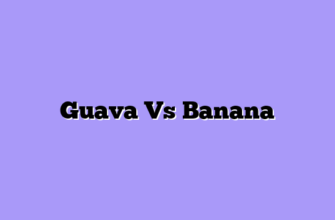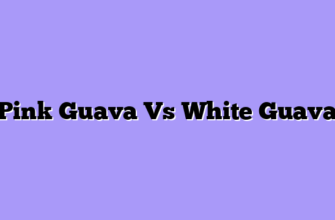Guava and mango are both tropical fruits that are popular worldwide for their delicious flavor and nutritional value. While they share similarities in their origins and taste, they also possess distinct nutritional profiles. Comparing these two fruits can help us understand their unique benefits and make informed choices about incorporating them into our diets.
Nutritional Comparison
Guava, a fruit native to Mexico and Central America, is known for its high vitamin C content. In fact, a single guava can provide more than twice the daily recommended intake of this essential vitamin, which plays a crucial role in boosting immunity and promoting collagen production. Guava is also a good source of dietary fiber, potassium, and folate, all of which contribute to overall health and well-being.

When comparing their nutritional profiles, it becomes evident that both guava and mango offer a wide range of essential vitamins and minerals. However, guava stands out for its exceptionally high vitamin C content, while mango excels in its vitamin A content. Both fruits are also good sources of dietary fiber, which is crucial for digestive health and regulating blood sugar levels.
In terms of their impact on health, both guava and mango have been linked to various health benefits. Guava, with its high vitamin C content, is known to boost immunity, protect against oxidative stress, and promote wound healing. Mango, with its rich vitamin A content, is beneficial for maintaining healthy vision, skin, and immune function. Both fruits are also believed to have anti-inflammatory properties and may help reduce the risk of certain chronic diseases.
Taste and Texture
Guava, with its firm, slightly grainy flesh, presents a unique textural experience. The texture can vary depending on the variety, ranging from soft and creamy to slightly firm and fibrous. The flavor, however, is consistently sweet and tangy, with a hint of citrus. Some varieties, like the strawberry guava, offer a subtle floral note, adding another layer of complexity to the taste.
Mango, on the other hand, boasts a smooth, creamy texture that melts in your mouth. The flesh is typically soft and juicy, making it a delightful treat. The flavor profile of mango is rich and sweet, with a hint of floral notes. Depending on the variety, the sweetness can range from mild to intensely sweet, with some varieties even exhibiting a slight tanginess.
When comparing the two fruits side-by-side, the difference in texture is immediately apparent. Guava’s grainy texture provides a satisfying chew, while mango’s smooth, creamy texture offers a luxurious mouthfeel. In terms of flavor, both fruits offer a sweet experience, but guava’s tanginess and subtle citrus notes create a more complex flavor profile. Mango, with its rich sweetness and floral hints, provides a more straightforward and indulgent taste.
The choice between guava and mango ultimately comes down to personal preference. If you enjoy a textural experience with a hint of tanginess, guava might be your preferred choice. However, if you crave a smooth, creamy texture and a rich, sweet flavor, mango will likely satisfy your taste buds.
Beyond their individual characteristics, guava and mango also offer distinct nutritional benefits. Guava is a rich source of vitamin C, fiber, and antioxidants, while mango is packed with vitamins A and C, as well as potassium and fiber. Both fruits are low in calories and fat, making them a healthy and delicious addition to any diet.
Culinary Uses
Guava, with its slightly tart and tangy flavor, is often used in sweet preparations. Its firm texture allows it to hold its shape well when cooked, making it ideal for jams, jellies, and chutneys. The guava’s subtle acidity balances the sweetness of sugar, creating a harmonious flavor profile. In desserts, guava is frequently incorporated into pies, tarts, and cakes, adding a refreshing twist to traditional recipes. Its vibrant pink hue also adds a visually appealing element to baked goods.
Beyond its sweet applications, guava also finds its place in savory dishes. Its tartness complements the richness of meats and seafood, making it a popular ingredient in curries, stews, and salsas. Guava’s unique flavor profile adds a touch of complexity to savory dishes, enhancing their overall taste.
Mango, on the other hand, is known for its rich, sweet, and slightly tangy flavor. Its creamy texture makes it a popular choice for smoothies, juices, and ice creams. Mango’s sweetness is often balanced with a touch of acidity, such as lime juice, to create a refreshing and flavorful combination. In desserts, mango is frequently used in puddings, cheesecakes, and mousses, adding a tropical touch to classic recipes.
Mango’s versatility extends beyond sweet applications. Its sweetness and tanginess make it a perfect ingredient for savory dishes, particularly those with a spicy kick. Mango chutney, a staple in Indian cuisine, adds a sweet and tangy counterpoint to spicy curries and grilled meats. Mango salsa, with its vibrant colors and refreshing flavor, is a popular accompaniment to grilled fish and chicken.
While both guava and mango are primarily known for their sweet applications, their unique flavor profiles and textures allow them to be incorporated into a wide range of savory dishes. Guava’s tartness and firm texture make it a suitable ingredient for curries, stews, and salsas, while mango’s sweetness and creamy texture lend themselves to chutneys and salsas that complement spicy dishes.
Health Benefits
Guava, a small, pear-shaped fruit with a distinct aroma, is a powerhouse of vitamin C. In fact, it contains four times the amount of vitamin C found in oranges, making it an excellent source for boosting immunity and protecting against oxidative stress. Additionally, guava is rich in dietary fiber, which aids digestion and promotes satiety. Its high potassium content helps regulate blood pressure and supports heart health. Furthermore, guava is a good source of folate, essential for cell growth and development, particularly during pregnancy.

While both guava and mango offer a range of health benefits, their unique nutritional profiles make them suitable for different needs. For individuals seeking a high dose of vitamin C, guava is the superior choice. However, if vitamin A is a priority, mango takes the lead. Both fruits are excellent sources of fiber, potassium, and antioxidants, making them valuable additions to a balanced diet.
In terms of their impact on blood sugar levels, guava has a lower glycemic index (GI) than mango. This means that guava is less likely to cause rapid spikes in blood sugar levels, making it a better choice for individuals with diabetes or those managing their blood sugar. However, it’s important to note that both fruits are high in natural sugars, so moderation is key.
Tips for Home Gardeners
Guava trees are generally smaller than mango trees, reaching heights of 15 to 30 feet. They are also more adaptable to a wider range of climates, thriving in both tropical and subtropical regions. Guava trees prefer well-drained soil and full sun exposure, but they can tolerate some shade. Mango trees, on the other hand, require a tropical climate with warm temperatures and high humidity. They need ample sunlight and well-drained soil that is rich in organic matter.
When it comes to propagation, both guava and mango trees can be grown from seeds, but grafting is often preferred for mango trees as it ensures the production of fruit that is true to type. Guava trees can also be propagated through cuttings.
The time it takes for guava and mango trees to bear fruit varies depending on the variety and growing conditions. Guava trees typically start producing fruit within two to three years after planting, while mango trees may take four to five years.
Guava trees are relatively low-maintenance, requiring minimal pruning and fertilization. However, mango trees require more attention, especially during their early years. Regular pruning is essential to maintain a strong structure and encourage fruit production. Mango trees also benefit from regular fertilization, particularly with nitrogen and potassium.
Both guava and mango trees are susceptible to a variety of pests and diseases. Guava trees are particularly vulnerable to fruit flies, while mango trees are prone to anthracnose and powdery mildew. Regular monitoring and timely intervention are crucial to prevent these problems from becoming serious.
Harvesting guava and mango fruits is a rewarding experience for home gardeners. Guava fruits are typically harvested when they are firm and slightly green, while mango fruits are ready for picking when they are ripe and have a sweet aroma.
In conclusion, both guava and mango trees offer unique benefits and challenges for home gardeners. Guava trees are relatively easy to grow and produce fruit quickly, while mango trees require more care but offer a larger and more flavorful fruit. Ultimately, the best choice for your home garden depends on your individual preferences and growing conditions.
Q&A
**1. Which fruit is sweeter?**
Mango
**2. Which fruit has a higher vitamin C content?**
Guava
**3. Which fruit is typically eaten raw?**
Both, but mango is more commonly eaten raw.
**4. Which fruit is more versatile in cooking?**
Mango
**5. Which fruit is more readily available in the United States?**
Guava and mango are both delicious tropical fruits with distinct flavors and nutritional profiles. Guava is known for its tart and slightly sweet flavor, while mango is renowned for its sweet and juicy taste. Both fruits are rich in vitamins, minerals, and antioxidants, making them healthy additions to a balanced diet. Ultimately, the choice between guava and mango depends on personal preference and desired nutritional benefits.








